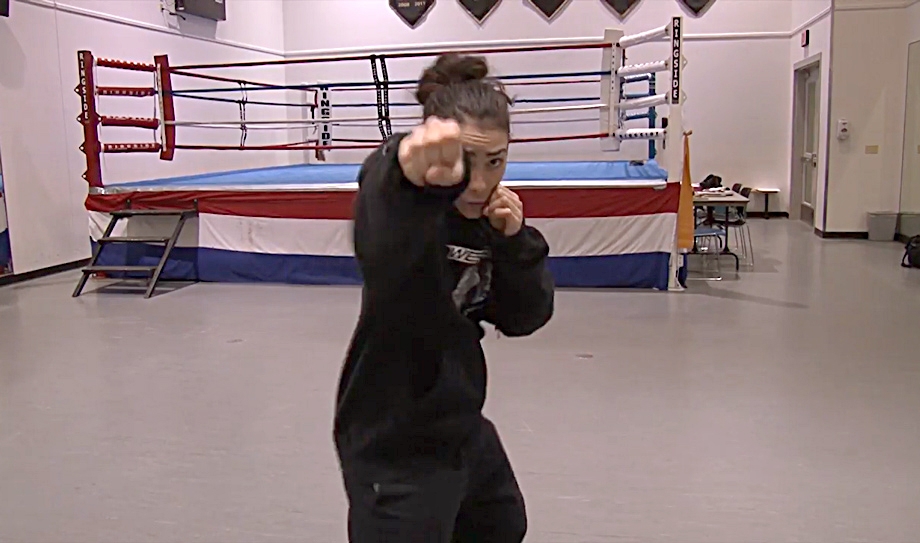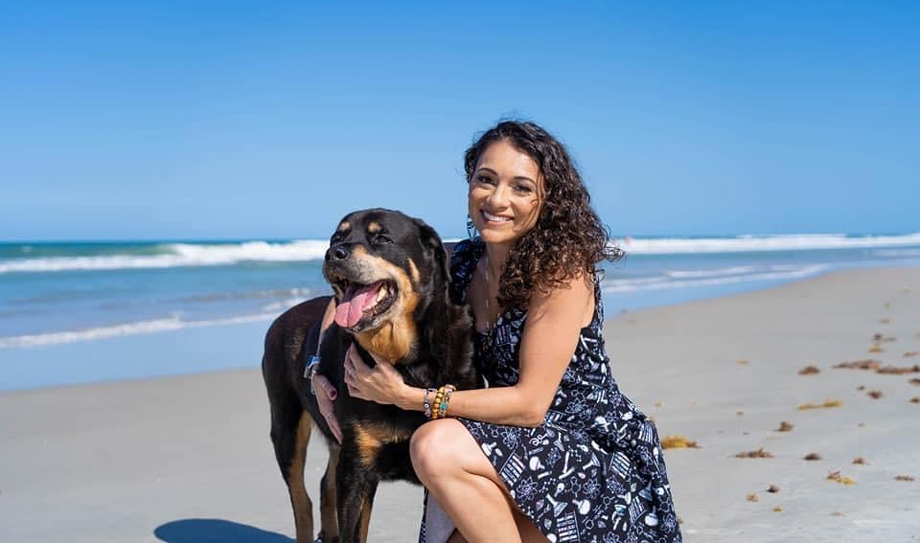Giovanna Camacho trained to be an Army officer at the United States Military Academy. When she entered West Point, she was already pretty good at taking — and delivering — a punch.
She would get better, figuratively and literally, sparring with the institution to establish and captain the women's boxing team.
During her 11 years in the Army, including more than five as a medical service officer, Camacho spent 11 months in the Army's World Class Athlete Program as a boxer. At 106 pounds, she placed fourth at the 2016 Olympic Trials in the 112-pound weight class.
Now, as a Ph.D. student in associate professor Matthew Bolton’s lab in the Department of Systems and Information Engineering at the University of Virginia School of Engineering and Applied Science, the grit she forged growing up and later in the boxing ring and in the military, has helped her land a selection as a 2023 Tillman Scholar.

The scholarships recognize potential to lead activities that address pressing societal needs. She will receive $27,000 over two years while working on her degree.
Camacho’s duties in the Army revolved around training, planning and logistics, and managing medical operations in varying settings, from her first post as a medical platoon leader to running patient administration at a community hospital. She left the Army in 2019 with the rank of captain.
Earning a master’s in human factors and behavioral neurobiology from Embry-Riddle Aeronautical University led her to Bolton’s Formal Human Systems Laboratory at UVA for her Ph.D. Her research is focused on human factors engineering — designing systems that account for human capabilities and fallibilities — as well as cyber-physical systems and robotics.
“I would love to work for the government helping to enhance civilian and soldier systems and equipment to prevent injuries and help further their abilities to excel,” Camacho said.
Bolton, who also is a member of UVA Engineering’s Link Lab, studies why engineered systems fail and how to prevent failures through human-centered design. He is an expert in using rigorous mathematical techniques called formal methods to analyze engineering-caused errors in human behavior and cognition that contribute to system failures.

Camacho’s journey to UVA wasn’t typical. UVA Engineering asked if she’d be willing to share her story.
There’s an article about you online in which you mention growing up without parents. Can you talk about that?
Growing up, I faced many difficulties. I believe that these experiences made me a stronger person because I knew, no matter how hard things were, I would find a way to overcome them. My home life was very unstable, but I stuck with things that were consistent, such as work, school and sports. I would escape through comics, movies and books.
Attending the United States Military Academy opened me up to a world where I could hone my passions, but it also showed me that I had new trials and tribulations to face as a female. Men and women were not yet treated equally at West Point.
I had learned early on to channel my anger through working out, but when I shifted my focus to boxing, the sport taught me how to approach life.
In the ring, just like life, you focus on right here and right now, you look forward and never back, you move towards the punch, you pivot to get a new angle, you know when to engage, you parry away the hits you see coming. You look for instances where your opponent is telegraphing, you learn to attack first when the time is right, you learn to counter instantly, you dance around the ring to relax, you look for openings. When you miss or slip you reset quickly, when things get tough you breathe in through your nose and out through your mouth to find calm in the hectic space. Of course you get hit, but you keep moving forward.
With every loss I learned something new, and with every win I fixated on what strategies and methods helped get me that win. The lessons I learned in the ring healed a lost girl. I learned how to keep my eyes up and my head down and keep grinding, pushing forward in the ring of life.
Boxing helped me to understand constructive criticism and learn to listen to all the advice everyone gave me, regardless of experience level. I learned quickly to consider the advice, but in the end, it is me who decides what works for me.
In holding myself accountable, I am stronger for the team. Every success is not just a representation of myself, but those who helped me prepare. Every day, I want to be better than I was before, mentally and physically. The setbacks will come, and I will get hit, move forward and keep learning.
How did you get into boxing?
I first began kickboxing at Ramtown Karate in Dixon, California. I was the janitor and they needed more female representation at the gym, so they asked me if I would be interested in taking some classes for free. I won a competition and they continued to train me, and this was my healthy outlet for a lot of pent-up anger and frustration.
I eventually left for West Point, where I wanted to join the boxing program since it was the closest thing to kickboxing. I soon found out the boxing team was not coed and was just for males. All of the female cadets who would come to hit bags in Arvin Gym were kicked out, even on the first-floor level, which had bags that were supposedly open for use by all cadets.
We continued to train with the permission of our tactical officers at Camp Buckner right outside of post and called ourselves “The Underground.” After many meetings with the commandant and the support of many individuals and strong women in leadership roles, we were able to compete and earn club status, which is a legacy I am proud of.
Today the boxing team at West Point is coed. Going back and training with the cadets last year was an incredible experience. I was asked to share the history with them, though it’s a story I didn’t want to have to tell. It made me happy to know many of them had no idea what I was talking about — which means things are normal, as they should be.
How did you end up at UVA?
Dr. Matthew Bolton sent an email to the Department of Human Factors and Behavioral Neurobiology at Embry-Riddle stating he was taking interviews for individuals interested in applying for the Ph.D. program in systems engineering. I was very interested in his work and had been advised to pick my program based on the advisor. After interviewing with quite a few schools and talking with a lot of faculty, I made my decision that he was the best advisor for me — very much like a young Jedi trying to find their Yoda.